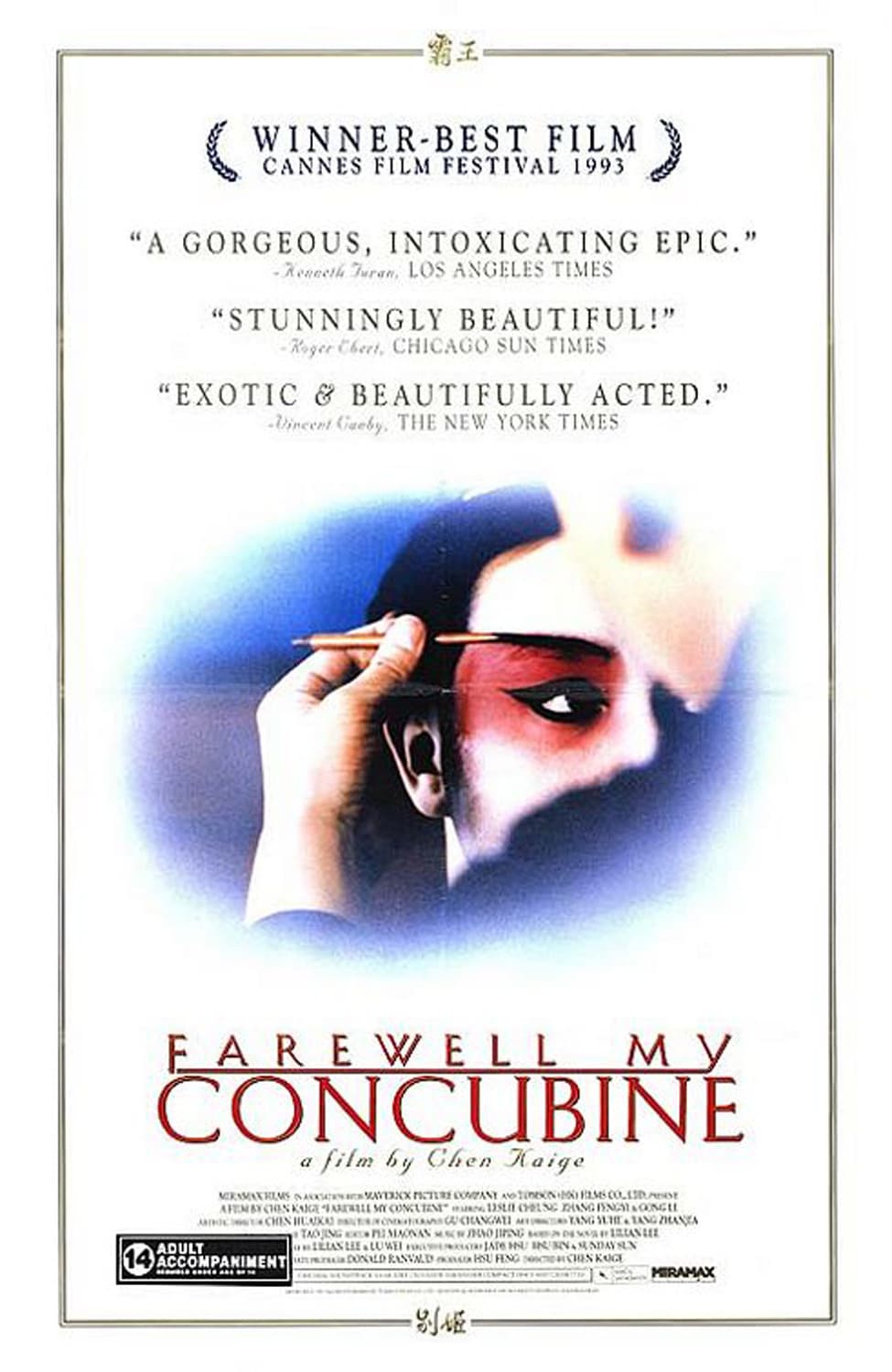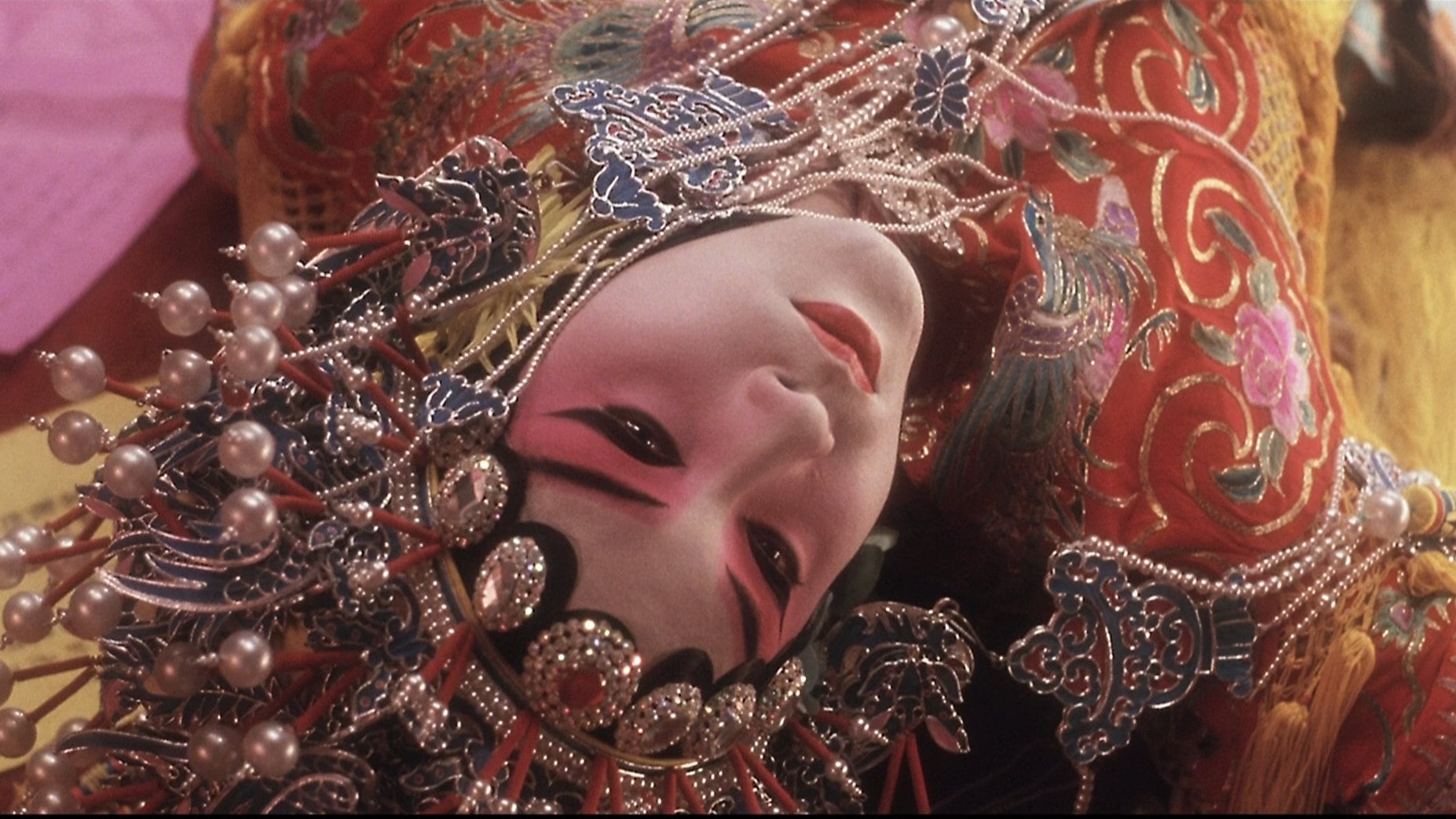How had I never seen... "Farewell My Concubine" (1993)
 Monday, October 28, 2019 at 11:30AM
Monday, October 28, 2019 at 11:30AM In this new series, members of Team Film Experience watch and share their reactions to classic films they’ve never seen.
 by Tim Brayton
by Tim Brayton
I wish there was a good reason why it took me 26 years to catch up with Chen Kaige's Farewell My Concubine, co-winner of the 1993 Palme d'Or, two-time Oscar nominee for Best Cinematography and Best Foreign-Language Film, and the film that did more than probably any other single title to present Chinese art cinema to international audiences in the 1990s. Instead, I only have a very terrible reason: it's 171 minutes long, and I never quite managed to make it my top priority in those moments when I had three uninterrupted hours.
To the surprise of nobody, including myself, that turns out to have been a terrible mistake. As long as the film is – and I'd be fibbing if I said that I never once felt that running time – it's unquestionably filling every last one of those minutes with a whole lot of immensely appealing stuff. That Best Cinematography nomination wasn't for show: this is an unbelievably lavish epic of 20th Century history, surely one of the most gorgeous motion pictures of its decade...

Gu Changwei, the director of photography, bathes every last interior in a richly over-saturated fog of nostalgic roses and contemplative blues, while giving the exteriors a clean white precision that's so present you almost feel like you could step right into the movie's recreation of pre-Maoist Beijing. To say nothing of the costumes designed by Chen Changmin, lovely displays of textured colors and patterns, or the dense sets by production designers Yang Yuhe and Yang Zhanjia, and art direector Chen Huaikai. Farewell My Concubine fussily lingers over the spaces and surfaces of the bygone past with an opulence that recalls the Hollywood epics of the '60s, only without the tendency towards over-lighting that kept those films looking proudly artificial. On the contrary, the smokey, dim atmosphere of this film is just one more way it manages to look lived-in and authentic.
Raw sensual pleasures aren't to be denied, but of course that's not actually what Farewell My Concubine is about. At least not only that. Spanning 53 years from the 1920s to the '70s, this is a novelistic story about a friendship put under pressure from without and within: on the one hand, there's the little matter of Mao's Cultural Revolution and the bloody transformation of Chinese society over the course of just a few years. On the other, there's a love triangle to contend with, though one whose sides are a bit unexpected and unusual. The short version of a very long story is that Douzi (Leslie Cheung) and Shitou (Zhang Fengyi) met as children in a school for Chinese opera performers. As they grow up, Douzi is trained specifically in playing female characters, and as the boys come to adulthood, they become celebrated for their production of an opera named Farewell My Concubine, with Douzi, under the stage name Cheng Dieyi, playing the concubine shortly to be abandoned by the king played by Shitou, now known as Duan Xiaolou. Douzi is in love with the other man, and thus grows furious with jealousy when Shitou falls in love with the prostitute Juxian (Gong Li).

It's a melodrama worthy of its own opera, though Chen and his collaborators treat this all without sensationalism. For all the film's opulence and visual extravagance, Farewell My Concubine is firmly rooted in a low-key realism that focuses on the character dynamics and the feelings of each of the three leads. For that, more than anything, is the real subject of the movie: how to remain a simple, everyday human in the face of historical events that have very little interest in the personalities of three individuals. The script, by Lillian Lee and Lu Wei, moves through a series of isolated slices of time, letting us see the sweep of history by dropping us into disconnected moments and demanding that we catch up; it's a great way of seeing the massive changes that the characters have to weather, while also encouraging us to think about how the characters themselves have changed at the same time.
This is a fantastic approach to making a historical epic grounded in characer's lives: the film does such a great job of pulling us into the protagonists' heads that it feels intimate and personal in a way that the enormous scope of the story and scale of the production would seem to work against. I don't suppose it could possibly be as exciting comign to it now as it would have been in 1993, but it's still a vibrant, fresh piece of storytelling, full of feelings that this genre sometimes has a hard time foregrounding amidst all the gravity and opulence. Not that the opulence isn't great; and on top of that, it's a real treat to see the opera productions scattered throughout the film, adding a layer of opulence within opulence. But that's not enough to make Farewell My Concubine a decade-defining classic; that's all down to the extraordinarily strong, omnipresent emotions that the film raises throughout its running time. And with a running time like that, that's a lot of emotions.

Previously in this series...
"M" (31) by Mark Brinkerhoff
"Z" (69) by Mark Brinkherhoff
Cabaret (72) by Ben Miller
Enter the Dragon (73) by Cláudio Alviles
The Parallax View / Three Days of the Condor (74/75) by Lynn Lee



Reader Comments (3)
One of the best films of all time.
And Gong li deserved that oscar!
Man, that was a great film and I didn't think it was long at all. Plus, Gong Li fucking delivered and then some in that film.
I know we all love actresses on gong li is great but c’mon Leslie Cheung is truly remarkable in this movie and would have been my best actor vote. He basically carries the movie, with about twice the screen time as his colleagues and a script linked completely to his POV and emotional gradations. Not to slight the others who are totally super, but his is IMO the true achievement of the movie